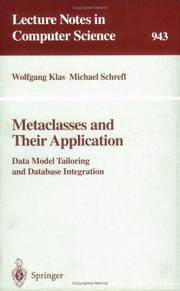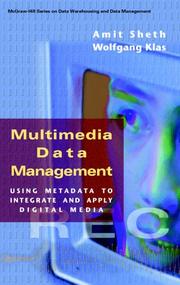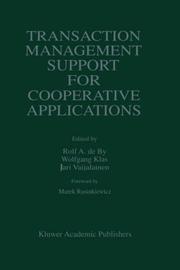| Listing 1 - 10 of 12 | << page >> |
Sort by
|

ISBN: 3540600639 3540494235 9783540600633 Year: 1995 Volume: 943 Publisher: Berlin ; Heidelberg ; New York Springer
Abstract | Keywords | Export | Availability | Bookmark
 Loading...
Loading...Choose an application
- Reference Manager
- EndNote
- RefWorks (Direct export to RefWorks)
Conventional object-oriented data models are closed: although they allow users to define application-specific classes, they usually come with a fixed set of modelling primitives. This constitutes a major problem, as different application domains, e.g. database integration or multimedia, need special support. Using an extended metaclass concept, this book provides for the solution of this problem a simple but extendible open object-oriented data model, a so-called RISC model. By introducing the basic concepts of the open object-oriented database management system VODAK, it demonstrates how the extended metaclass concept can be integrated homogeneously into object-oriented data models.
Banques de données--Gestion --- Data base management --- Database management --- Databasebeheer --- Databases--Beheer --- Gegevensbanken--Beheer --- Gegevensbestanden--Beheer --- Generalized data management systems --- Object-georiënteerd programmeren (Informatica) --- Object-oriented programming (Computer science) --- Programmation par objets (Informatique) --- Systems [Data base management ] --- Systems [Generalized data base management ] --- Database management. --- Computer science. --- Data structures (Computer scienc. --- Artificial intelligence. --- Database Management. --- Programming Languages, Compilers, Interpreters. --- Data Structures. --- Artificial Intelligence. --- Information Systems Applications (incl. Internet). --- AI (Artificial intelligence) --- Artificial thinking --- Electronic brains --- Intellectronics --- Intelligence, Artificial --- Intelligent machines --- Machine intelligence --- Thinking, Artificial --- Bionics --- Cognitive science --- Digital computer simulation --- Electronic data processing --- Logic machines --- Machine theory --- Self-organizing systems --- Simulation methods --- Fifth generation computers --- Neural computers --- Informatics --- Science --- Data services (Database management) --- Database management services --- DBMS (Computer science) --- Services, Database management --- Systems, Database management --- Systems, Generalized database management

ISBN: 0070577358 9780070577350 Year: 1998 Publisher: New York (N.Y.) : McGraw-Hill,
Abstract | Keywords | Export | Availability | Bookmark
 Loading...
Loading...Choose an application
- Reference Manager
- EndNote
- RefWorks (Direct export to RefWorks)
Multimedia systems --- Metadata --- Metadatabases --- Database management --- Database management. --- Metadata. --- Metadatabases. --- Multimedia systems.
Book
ISBN: 9783940344496 3940344494 Year: 2008 Publisher: Universitätsverlag Göttingen
Abstract | Keywords | Export | Availability | Bookmark
 Loading...
Loading...Choose an application
- Reference Manager
- EndNote
- RefWorks (Direct export to RefWorks)
Metadata is a key aspect of our evolving infrastructure for information management, social computing, and scientific collaboration. DC-2008 will focus on metadata challenges, solutions, and innovation in initiatives and activities underlying semantic and social applications. Metadata is part of the fabric of social computing, which includes the use of wikis, blogs, and tagging for collaboration and participation. Metadata also underlies the development of semantic applications, and the Semantic Web the representation and integration of multimedia knowledge structures on the basis of semantic models. These two trends flow together in applications such as Wikipedia, where authors collectively create structured information that can be extracted and used to enhance access to and use of information sources. Recent discussion has focused on how existing bibliographic standards can be expressed as Semantic Web vocabularies to facilitate the ingration of library and cultural heritage data with other types of data. Harnessing the efforts of content providers and end-users to link, tag, edit, and describe their information in interoperable ways (ʺparticipatory metadataʺ) is a key step towards providing knowledge environments that are scalable, self-correcting, and evolvable. DC-2008 will explore conceptual and practical issues in the development and deployment of semantic and social applications to meet the needs of specific communities of practice.
Dublin Core --- Metadata --- Congresses. --- Congresses.
Book
Year: 2008 Publisher: Göttingen : Universitätsverlag Göttingen,
Abstract | Keywords | Export | Availability | Bookmark
 Loading...
Loading...Choose an application
- Reference Manager
- EndNote
- RefWorks (Direct export to RefWorks)
Metadata is a key aspect of our evolving infrastructure for information management, social computing, and scientific collaboration. DC-2008 will focus on metadata challenges, solutions, and innovation in initiatives and activities underlying semantic and social applications. Metadata is part of the fabric of social computing, which includes the use of wikis, blogs, and tagging for collaboration and participation. Metadata also underlies the development of semantic applications, and the Semantic Web? the representation and integration of multimedia knowledge structures on the basis of semantic models. These two trends flow together in applications such as Wikipedia, where authors collectively create structured information that can be extracted and used to enhance access to and use of information sources. Recent discussion has focused on how existing bibliographic standards can be expressed as Semantic Web vocabularies to facilitate the ingration of library and cultural heritage data with other types of data. Harnessing the efforts of content providers and end-users to link, tag, edit, and describe their information in interoperable ways (?participatory metadata?) is a key step towards providing knowledge environments that are scalable, self-correcting, and evolvable. DC-2008 will explore conceptual and practical issues in the development and deployment of semantic and social applications to meet the needs of specific communities of practice.
Book
Year: 2008 Publisher: Göttingen : Universitätsverlag Göttingen,
Abstract | Keywords | Export | Availability | Bookmark
 Loading...
Loading...Choose an application
- Reference Manager
- EndNote
- RefWorks (Direct export to RefWorks)
Metadata is a key aspect of our evolving infrastructure for information management, social computing, and scientific collaboration. DC-2008 will focus on metadata challenges, solutions, and innovation in initiatives and activities underlying semantic and social applications. Metadata is part of the fabric of social computing, which includes the use of wikis, blogs, and tagging for collaboration and participation. Metadata also underlies the development of semantic applications, and the Semantic Web? the representation and integration of multimedia knowledge structures on the basis of semantic models. These two trends flow together in applications such as Wikipedia, where authors collectively create structured information that can be extracted and used to enhance access to and use of information sources. Recent discussion has focused on how existing bibliographic standards can be expressed as Semantic Web vocabularies to facilitate the ingration of library and cultural heritage data with other types of data. Harnessing the efforts of content providers and end-users to link, tag, edit, and describe their information in interoperable ways (?participatory metadata?) is a key step towards providing knowledge environments that are scalable, self-correcting, and evolvable. DC-2008 will explore conceptual and practical issues in the development and deployment of semantic and social applications to meet the needs of specific communities of practice.
Book
ISBN: 0387600639 Year: 1995 Publisher: Berlin : Springer-Verlag,
Abstract | Keywords | Export | Availability | Bookmark
 Loading...
Loading...Choose an application
- Reference Manager
- EndNote
- RefWorks (Direct export to RefWorks)

ISBN: 0792381009 Year: 1998 Volume: SECS 433 Publisher: Boston : Kluwer Academic Publishers,
Abstract | Keywords | Export | Availability | Bookmark
 Loading...
Loading...Choose an application
- Reference Manager
- EndNote
- RefWorks (Direct export to RefWorks)
Transaction systems (Computer systems) --- Teams in the workplace --- Systèmes transactionnels --- Equipes de travail --- Management. --- Data processing. --- Gestion --- Informatique
Book
Year: 2008 Publisher: Universitätsverlag Göttingen
Abstract | Keywords | Export | Availability | Bookmark
 Loading...
Loading...Choose an application
- Reference Manager
- EndNote
- RefWorks (Direct export to RefWorks)
Metadata is a key aspect of our evolving infrastructure for information management, social computing, and scientific collaboration. DC-2008 will focus on metadata challenges, solutions, and innovation in initiatives and activities underlying semantic and social applications. Metadata is part of the fabric of social computing, which includes the use of wikis, blogs, and tagging for collaboration and participation. Metadata also underlies the development of semantic applications, and the Semantic Web — the representation and integration of multimedia knowledge structures on the basis of semantic models. These two trends flow together in applications such as Wikipedia, where authors collectively create structured information that can be extracted and used to enhance access to and use of information sources. Recent discussion has focused on how existing bibliographic standards can be expressed as Semantic Web vocabularies to facilitate the integration of library and cultural heritage data with other types of data. Harnessing the efforts of content providers and end-users to link, tag, edit, and describe their information in interoperable ways (”participatory metadata”) is a key step towards providing knowledge environments that are scalable, self-correcting, and evolvable. DC-2008 will explore conceptual and practical issues in the development and deployment of semantic and social applications to meet the needs of specific communities of practice.
Social Sciences --- Library & Information Science --- metadata --- social applications --- semantic applications --- Dublin Core --- Folksonomy --- Library of Congress Subject Headings --- Resource Description Framework --- Simple Knowledge Organization System --- Uniform Resource Identifier
Book
Year: 2008 Publisher: Universitätsverlag Göttingen
Abstract | Keywords | Export | Availability | Bookmark
 Loading...
Loading...Choose an application
- Reference Manager
- EndNote
- RefWorks (Direct export to RefWorks)
Metadata is a key aspect of our evolving infrastructure for information management, social computing, and scientific collaboration. DC-2008 will focus on metadata challenges, solutions, and innovation in initiatives and activities underlying semantic and social applications. Metadata is part of the fabric of social computing, which includes the use of wikis, blogs, and tagging for collaboration and participation. Metadata also underlies the development of semantic applications, and the Semantic Web — the representation and integration of multimedia knowledge structures on the basis of semantic models. These two trends flow together in applications such as Wikipedia, where authors collectively create structured information that can be extracted and used to enhance access to and use of information sources. Recent discussion has focused on how existing bibliographic standards can be expressed as Semantic Web vocabularies to facilitate the integration of library and cultural heritage data with other types of data. Harnessing the efforts of content providers and end-users to link, tag, edit, and describe their information in interoperable ways (”participatory metadata”) is a key step towards providing knowledge environments that are scalable, self-correcting, and evolvable. DC-2008 will explore conceptual and practical issues in the development and deployment of semantic and social applications to meet the needs of specific communities of practice.
Book
Year: 2008 Publisher: Universitätsverlag Göttingen
Abstract | Keywords | Export | Availability | Bookmark
 Loading...
Loading...Choose an application
- Reference Manager
- EndNote
- RefWorks (Direct export to RefWorks)
Metadata is a key aspect of our evolving infrastructure for information management, social computing, and scientific collaboration. DC-2008 will focus on metadata challenges, solutions, and innovation in initiatives and activities underlying semantic and social applications. Metadata is part of the fabric of social computing, which includes the use of wikis, blogs, and tagging for collaboration and participation. Metadata also underlies the development of semantic applications, and the Semantic Web — the representation and integration of multimedia knowledge structures on the basis of semantic models. These two trends flow together in applications such as Wikipedia, where authors collectively create structured information that can be extracted and used to enhance access to and use of information sources. Recent discussion has focused on how existing bibliographic standards can be expressed as Semantic Web vocabularies to facilitate the integration of library and cultural heritage data with other types of data. Harnessing the efforts of content providers and end-users to link, tag, edit, and describe their information in interoperable ways (”participatory metadata”) is a key step towards providing knowledge environments that are scalable, self-correcting, and evolvable. DC-2008 will explore conceptual and practical issues in the development and deployment of semantic and social applications to meet the needs of specific communities of practice.
Social Sciences --- Library & Information Science --- metadata --- social applications --- semantic applications --- Dublin Core --- Folksonomy --- Library of Congress Subject Headings --- Resource Description Framework --- Simple Knowledge Organization System --- Uniform Resource Identifier --- metadata --- social applications --- semantic applications --- Dublin Core --- Folksonomy --- Library of Congress Subject Headings --- Resource Description Framework --- Simple Knowledge Organization System --- Uniform Resource Identifier
| Listing 1 - 10 of 12 | << page >> |
Sort by
|

 Search
Search Feedback
Feedback About
About Help
Help News
News